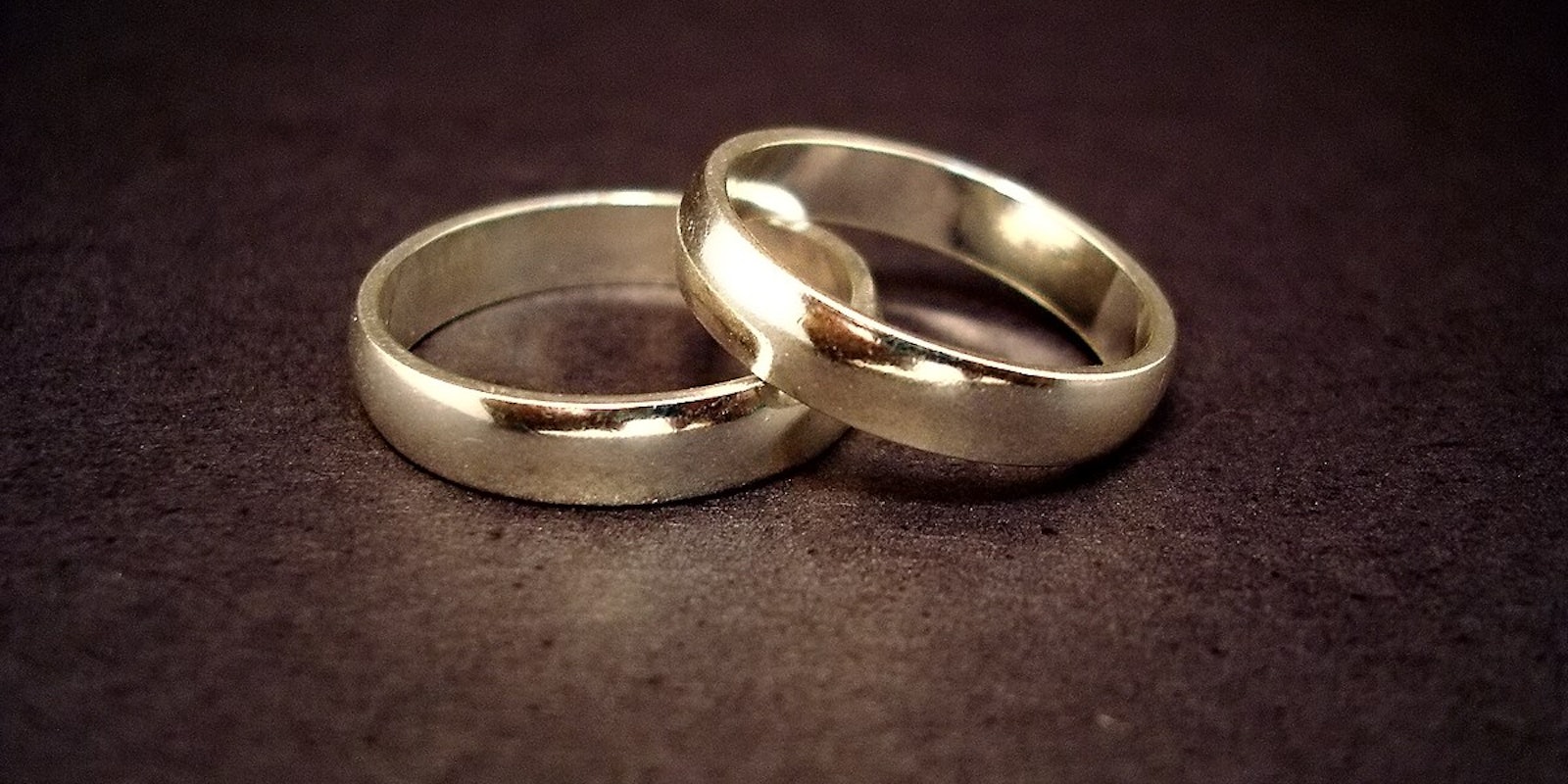Planning a wedding is cake if you’re going to the courthouse or eloping in Vegas. But the type of wedding that’s increasingly become “standard” over the past 100 years in America—one with more than a handful of guests, bridesmaids, dinner, drinks, and dancing—is an event that most of us have no experience planning, and yet are expected to pull off flawlessly.
But as with many things now, there’s an app for that.
There are websites that offer easy-to-follow planning checklists. There are apps that help affianced couples organize their budgets, keep track of RSVPs, and write thank-you notes. But there are also apps that continue the long tradition of the wedding industry—upselling the couple by implying the goods as a requirement for any “most important day.”
The upsell is a common tactic amplified by the perceived stakes of the wedding. This is supposed to be your special, perfect day, it argues, so shouldn’t you splurge for the orchid centerpieces instead of some cheaper flower?
Not only does it associate more expensive choices with better ones, it changes your whole approach. The issue becomes which centerpieces you should have, not whether or not you want them.
The assumption is not that there won’t be social media, but that it’s enough to warrant a full-time job.
Similarly, wedding apps have couples trying to keep up with the Joneses in more tech-savvy ways. It’s assumed you’ll have a wedding hashtag, so this hashtag generator just helps you come up with the right one. Your wedding must have a color scheme, so with the Wedding Colors app you can spin through the color wheel to coordinate the bridesmaids. Use Wedding Dances to learn a first dance routine that’s sure to go viral, and with apps like the Big Day your guests can even request songs in advance.
Even the wedding checklist apps start to seem more mandatory. You are having a videographer, right? Because it’s six months out and you should have booked them by now.
There are even services that offer to control your wedding’s social media presence for you. Maid of Social offers consultations on wedding hashtags, potential media company features, livestreaming to guests (and strangers) who couldn’t be there in person; all “because the day you just spent 14 months planning needs a social media strategy.” In its FAQ, when a hypothetical bride asks why they can’t just have a bridesmaid or friend upload a few shots to Instagram, the reply goes “your bridesmaid should be able to enjoy the day with you—not be responsible for posting on social media throughout the day.” The assumption is not that there won’t be social media, but that it’s enough to warrant a full-time job.
Kristen Maxwell Cooper, deputy editor at the Knot, has certainly noticed an uptick in the number of apps available to couples, and how quickly using them has become the norm for wedding planning. But the things they accomplish are nothing new, whether they’re for planning, inspiration boards, or taking requests from guests. The only thing that’s different is that millennials are more likely to use them. “The people who are getting married are millennials, and everything is an app. They get a car service with an app and order food through an app. It’s just something that’s natural to them, and something that’s going to be less natural to them is to buy a binder and build a checklist and carry it around,” she said.
Cooper agrees that the “norms” for weddings, and the role of social media, are changing. When she got married three years ago, she said her sister thought she was weird for wanting a wedding hashtag. Now it seems expected that many young couples will come up with one, and these increasing expectations can get overwhelming. “We’re seeing the extremes,” said Cooper.
On one hand, there are couples who have the hashtags, the song-request apps, and the social media managers who curate everything on Instagram. But there are also couples who are pushing back against this tide and going for “unplugged” weddings, asking that their guests put down their phones and apps and be present in the moment.
Perhaps people are going to extremes because it’s increasingly hard to live in the middle. Unless a couple makes it clear that nobody is to be posting on social media, they’ll have to field the now-inevitable questions about hashtags. Unless they know exactly what they’re doing, they’ll likely need a checklist, and Cooper is right that 20-somethings probably don’t want to be carrying around binders. Even for the sillier apps like a color generator: “How many weird BuzzFeed quizzes have you taken? Millennials thrive on that stuff,” she said.
No matter how a couple plans their wedding, Cooper said it’s necessary to be able to step away: “It’s so important to take those moments to unplug or put the binder down and be together.”
And that’s where these apps can cause problems, because it’s harder to walk away when the planning binder is on your phone. The appeal of these apps is they’re always with you on your phone, accessible at any moment. It’s a blessing that’s also a curse. At work, at dinner, at 3am, you can be flipping through dresses and colors, poring over the guest list, or fretting about what you should be doing four months out from the big day.
A wedding is a stressful event, and the key to dealing with stress is being able to remove yourself from your stressors. Apps may make the planning itself easier, but it also makes it easier for couples to access their stress, which comes not just from planning, but from the paradox of choice—which apps are best, easiest, or even necessary. But luckily, they can all be deleted as soon as the wedding is over.
Photo via Jeff Belmonte/Wikimedia Commons


